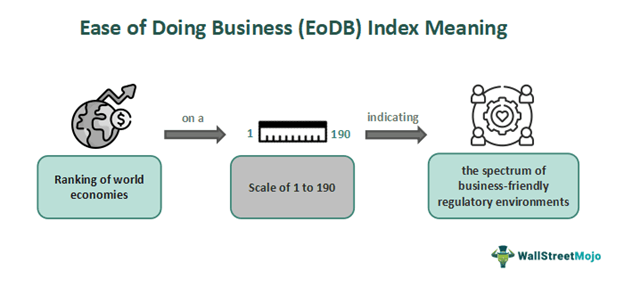Table Of Contents
What Is Ease Of Doing Business (EoDB) Index?
The ease of doing business (EoDB) index refers to the ranking of world economies on a scale of 1 to 190. The lowest numerical value indicates a more favorable regulatory system for business operations. Moreover, it indicates the degree of business conduciveness & startup possible within a country's regulatory environment of a country.

The World Bank has designed the index based on an aggregate score ranking of countries based on 10 specific areas articulated in its Doing Business report. The World Bank had started it to promote competition among nations. The index was removed in 2021 due to internal data irregularities. It is presently being examined for possible replacement with a new indicator.
Key Takeaways
- The Ease of Doing Business (EoDB) index arranges global economies on a scale of rank 1 to 190.
- The lowest numerical value shows the most business-friendly regulations among the other nations.
- It shows how the regulatory environment of a country encourages new business activities and existing businesses.
- EoDB indicates positive GDP growth and reform measures. It aids multinational companies in identifying competitive locations.
- The index also assists governments in economic policy formulation and helps businesses in strategic decision-making.
Ease Of Doing Business Index Explained
The Ease of Doing Business (EoDB) index ranks world economies from 1 to 190 based on the conduciveness of their regulatory environment to trade. The Ease of Doing Business index by the World Bank is determined by assessing scores related to 10 major topics or areas outlined in its Doing Business parameter, including:
- Business startup
- Electricity provision
- Construction permits
- Property Registration
- Access to credit
- Investor protection
- Tax payments
- Cross-border trading
- Contract enforcement
- Insolvency resolution
The EoDB score for every nation is calculated by a standardized survey provided to over 9000 local experts, including government officials, attorneys, and business consultants. This survey helps in collecting the data on regulations and their efficacy in achieving regulatory goals. Subsequently, an overall ranking is established for every topic and averaged to ensure comparability over time and across different economies.
EoDB aids in identifying those areas of economies needing to strengthen their regulatory environment through the provision of objective metrics of enforcement and business regulations. As a result, it leads to the promotion of business competition throughout world economies. Also, it improves the efficiency of regulations and further enhances the business environment.
Researchers from the corporate world, academics, policymakers, and journalists use EoDB as a benchmark for regulatory reform. It tracks development over time and offers practical information to improve business situations. A high EoDB rank also means that foreign investment is drawing a business regulatory environment. Hence, it leads to large job creation, better economic growth, and overall economic expansion.
How To Interpret?
The World Bank itself has explained the method of interpreting the index. The index aims to average a country’s performance across 10 areas contained in the Doing Business report by the World Bank, using percentile ranking. Further, the ranking associated with every topic is calculated as the simple mean of the component indicators as percentile rankings.
As a result, it ranks economies from 1 to 190, in which the first-place holding country becomes the best place to do business. A rank of 1 indicates that the country has the most business-friendly regulations for conducting and establishing a business. Also, the country falling on the last rank or 190 is the least favorable to conduct or start a business as per the ranking. In the 2023 Ease of Doing Business index, India ranks 63rd, and Africa ranks 84th.
Examples
Let us consider a few examples to understand the topic.
Example #1
Let us imagine Country A having a moderate level of convenience in doing business, particularly for startups. Hence, it has scored a position of 64 out of 100 points in the convenience of Doing Business index amongst 190 countries. It provides the following facilities for businesses to entrepreneurs:
- Hurdles to register property to own the land stand at 60.
- Smoothness of getting desired permits and license stands at 75.
- Difficulty in obtaining finances for new farmers stands at 55.
- The ease of obtaining utility connections has a score of 85.
Hence, the regulatory environment of Country A is business-friendly.
Example #2
An online published article discusses the convenience of doing business in the USA. The article underscores it as a premier international economic powerhouse having the largest consumer base. According to the Ease of Doing Business ranking in 2020, the United States was ranked 6th among 190 nations. Moreover, its ranking has been a consistent 10th in global competitiveness as per the IMD World Competitiveness Ranking for 2021.
Further, the nominal US GDP of $22.3939 trillion in 2021 has made it the fastest-developing economy. Its service sector has been the leading contributor to its economy. Furthermore, Silicon Valley, one of the best startup ecosystems in the world, has helped the US foster innovation. The US has achieved all this through tax incentives, financial support systems, and trade agreements that anchor its business growth.
Importance
The EoDB index is important to various agencies and corporations for several reasons:
- It helps governments formulate effective economic policies to achieve their economic goals.
- Businesses use it to strategize their navigation of the external elements impacting their operations.
- Multinational companies use it as a guide to identify competitive locations. The index highlights the best suitable locations with regulations for businesses.
- It guides corporates in making informed decisions regarding sectors and places to invest.
- It indicates the positive connection between GDP growth and reform measures.
- Higher rankings correlate with increased economic growth and foreign direct investments.
- Rankings also instill rivalry among nations to outpace each other in terms of the improved business environment.
- The World Bank has played a vital role in improving and evaluating business-friendly regulations globally.
